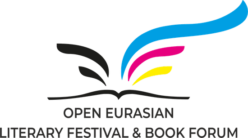Страна : Россия
Country : Russia
Ревью на книгу Гульсифат Шахиди “Сказки бабушки Гульсифат “
Current book is a collection of fairy tales written by Gulsifat Shakhidi a writer from Tajikistan / Great Britain. The author achieves the stated purpose of the book. Fairy tales are attractive and instructive to both adults and children.
Reading the part written from the Author to the children, immediately brings you back to your own childhood and your own grandmother’s love.
This book is attractive to children since most of them love stories about animals. These stories teach your child the value of friendship and family and the importance of that link between family generations. While reading, they learn about being different, being brave, about importance of support, such as Red Snout got from his family. They also learn about loyal friends, like Alyonushka the Doll, about family traditions, support and knowledge given from grandmother to mother to daughter, from father to a child, just like the tale of Dadysh the lion tells us.
As in Krylov’s fables, metaphorical characters in these tales express human emotions, vices and virtues. By the end of each story you learn what is good and bad. You, and most importantly your child are directed to make your own brief, but instructive, conclusion about how to act or not to act in a particular situation.
Comments \ concerns:Page 43 «took me in their tender white hands» \ Page 89 «взял в свои нежные белые руки»
In order to avoid possible misunderstanding \ misinterpretation of the message, I would recommend rephrasing the “white hands” with “warm hands” (as an example)
Page 44 «Her partner was a nice, kind guy called Senya» \ Page 90 «Рядом с ней всегда был хороший и добрый парень Сеня»
In order to avoid possible misunderstanding \ misinterpretation of the message I would recommend rephrasing the “partner” with “friend” (as an example) in English version of the text
Page 39 «A Kind Young Wolf» \ Page 85 «Добрый Волчонок»
To be honest this tale provoked ambivalent feelings. Especially given that I read the English version of the tale first.
Being a woman born and raised in USSR\Kazakhstan with an adulthood spent in USA, I have experience of living within two totally different cultures of East and West. As a result of my background and experience, reading the chain of following words made me feel frustrated and diminished:
“father had long been frustrated that he had no son. For this reason, I was deeply beloved from the moment I was born. My mother and my sisters took care of me and cherished me. My father was proud and held his head high because now he had a future leader, an heir. So it was that he started calling me by the nickname, “Leader.”
Reading this passage immediately reminded me of old beliefs which undervalue women and give them fewer opportunities than to men right from the day they are born. After reading this passage, the rest of the story, primarily about a young wolf being kind, no longer had any interest to me. I decided that this would not be a story that I would read to my child.
Of course, after reading a Russian version of the tale, the level of my concern was somewhat moderated. Nevertheless I still would not read this particular tale to my child due to presented point of view on the ”female-male” question. Another area of concern is the part of the story where the wolf as a new leader breaks the law of nature, destroys the family by declaring “there will be no pack”. I see more of a dictatorial leadership which could break a society, rather than, as intended I believe, a story of a kind young wolf who let others to become a leaders within their own families. This strengthens my opinion that I would not read this story to my child.
All comments\concerns presented are subjective opinion, indeed. Yet, might be something to be considered in future.
Данная книга представляет собой сборник сказок, написанных Гульсифат Шахиди, писательницей из Таджикистана / Великобритании. Заявленная цель книги автором достигнута. Сказки привлекательны и поучительны как для взрослых, так и для детей.
Чтение обращения автора к детям возвращает Вас в свое собственное детство и напоминает о любви Вашей бабушки.
Книга привлекательна для детей, так как большинство из них любят истории о животных. Эти истории учат Вашего ребенка ценности дружбы и семьи, а также важности связей между поколениями семьи. Читая, они узнают о том, что мы можем отличаться от других, можем быть смелыми, узнают о важности поддержки и помощи, например такой, которую получил Красный Пятачок от своей семьи. Они также узнают о верных друзьях, таких как кукла Алёнушка, о семейных традициях, поддержке и знаниях, передаваемых от бабушки к матери к дочери, от отца к ребенку, как рассказывает нам история льва по имени Дадыш.
Как в баснях Крылова, аллегорические персонажи в этих сказках выражают человеческие эмоции, пороки и достоинства. В конце каждой истории вы узнаёте, что хорошо, а что плохо. Сказка направляет читателя. Вы и, что важнее всего, ваш ребенок делаете собственный краткий и поучительный вывод о том, как действовать или не действовать в конкретной ситуации.
Комментарии \ возможные проблемы:
Стр. 43 «took me in their tender white hands» \ Стр. 89 «взял в свои нежные белые руки»
Во избежание недоразумений \ неверного толкования текста, я рекомендовала бы заменить словосочетание «белые руки» на «теплые руки» (как пример)
Стр. 44 «Her partner was a nice, kind guy called Senya» \ Стр. 90 «Рядом с ней всегда был хороший и добрый парень Сеня»
Во избежание недоразумений \ неверного толкования текста, я рекомендовала бы заменить слово «partner» на слово «friend» (как пример) в англ. версии текста
Стр. 39 «A Kind Young Wolf» \ Стр. 85 «Добрый Волчонок»
Честно говоря, эта история вызвала двойственные чувства. Особенно учитывая, что сначала я прочла версию рассказа на английском языке.
Будучи женщиной, родившейся и выросшей в СССР \ Республика Казахстан и повзрослевшей в США, я имею опыт жизни в двух совершенно разных культурах Востока и Запада. Благодаря данному опыту и как результат его наличия, прочтение следующих слов расстроило меня и привело к чувству подавленности:
“father had long been frustrated that he had no son. For this reason, I was deeply beloved from the moment I was born. My mother and my sisters took care of me and cherished me. My father was proud and held his head high because now he had a future leader, an heir. So it was that he started calling me by the nickname, “Leader.”
Прочтение этого отрывка сразу напомнило мне о старых убеждениях, в которых недооценивают женщин и предоставляют им меньше возможностей, чем мужчинам с самого дня их рождения. После прочтения этого отрывка остальная часть истории, прежде всего о добром молодом волке, перестала интересовать меня. Я решила, что эту историю читать своему ребенку я не буду.
Конечно, после прочтения русской версии сказки уровень моей озабоченности несколько снизился. Тем не менее, я все равно эту конкретную сказку читать своему ребенку не буду из-за изложенной точки зрения на вопрос о разнице «женщина-мужчина».
Другая проблемная область – это часть истории, в которой волк как новый лидер нарушает закон природы, разрушает семью, заявляя, что «Отныне не будет стаи». Я вижу больше историю диктаторского руководства, которое может разрушить общество, а не, как я предполагаю задумано, историю доброго волка, который позволяет другим становиться лидерами в своих семьях. Этот момент лишь укрепил мое мнение, что я не буду читать эту историю своему ребенку.
Представленные комментарии, несомненно, являются субъективным мнением. Тем не менее, возможно их следует учесть в будущем.


